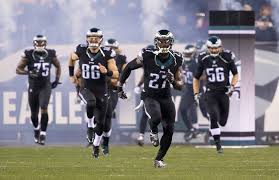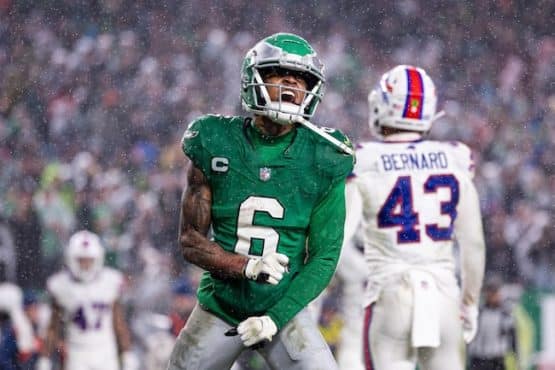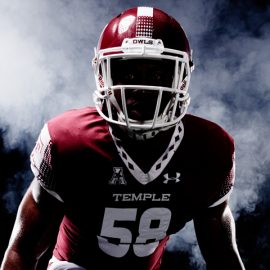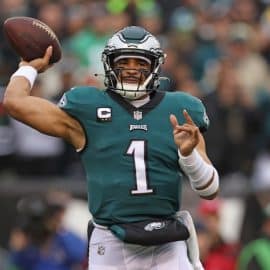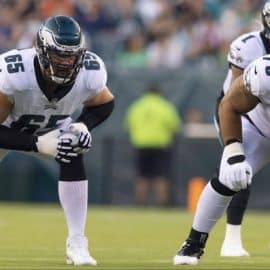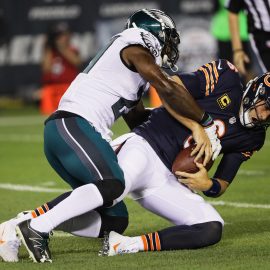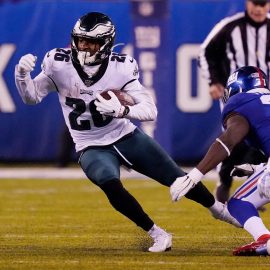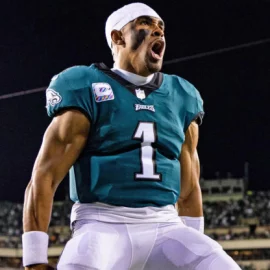Playoff football is here and I love it! I love it even more when the Eagles are in it. What does it take beyond what we currently have in terms of coaching and talent to get back to the promised land?
The last time we had a deep run into the playoffs was the January after the 2008 regular season. Since then we have had three also-ran one-and-done appearances following the 2009, 2010 and 2013 seasons.
There’s an old NFL saying that playoff football doesn’t build character, it reveals it. What was the character trait of that 2008 group which made it unique from the subsequent versions of Eagles teams?— teams which it was said by many critics “seemed to accept losing in the playoffs with graceful resignation.”
I would submit that the base talent level of the 2008 Eagles was actually inferior to that of the teams they fielded in following years. I mean, we were relying on a bunch of guys who would be cut from the team soon enough, like Kevin Curtis, Reggie Brown, Jason Avant, L.J. Smith, Dan Klecko, Joselio Hanson, Quintin Demps, Juqua Parker, Trevor Laws, Sean Considine, Hank Baskett, Darren Howard, Akeem Jordan, Omar Gaither, and the infamous Lorenzo Booker, to name a core group of players who probably could not make the current 7-9 roster of the 2016/2017 Eagles when in their primes.
But somehow that team came together to display a character of mental toughness which transcended the overall pool of talent.
A special kind of individual leadership seemed to blossom in that 2008 season from veterans like Brian Westbrook, Brian Dawkins, Sheldon Brown, Jon Runyan, Asante Samuel, Trent Cole and yes, even Donovan McNabb. It was almost as if you could sense these guys knew this might be their last rodeo. They began playing in late November with a chip on their shoulder, a can’t stand-to-lose mentality, like an underdog in it for the love of the sport, the excitement, the thrill of winning it all when at mid-season they had been counted out of the race.
They started playing tough—with a stubborn competitiveness and a persistent compulsion to win—and damn near toughed their way to a Super Bowl appearance.
I haven’t seen that kind of toughness in the Eagles team mindset since. Once they got going, that 2008 group played out of their minds, as if the rest of the league and every sportswriter in Philly were against them, and every team in the NFC East tried every dirty trick to cut them down.
Things are a lot more peaceful in the organization now. There is a less stressful corporate approach now to building a winner in the future. Fans and the media appear to be gracious in their patience with the process. But what concerns me is we are relying too much on recruiting a winning skill-based technique at the expense of building a team which runs on a coal-fire of toughness.
In a sport that’s supposed to be defined by a careful balance of talent and toughness, maybe our Birds could use an infusion of “tough”.
I don’t mean on-field violence or dirty deeds— I mean the kind of toughness of character and physical conditioning which produces a “knock the chip off my shoulder” mentality and dares an opponent to keep one from proving he belongs as a winner in the NFL.
The kind of individual toughness I am referencing has historically been a product of growing up poor and oppressed. Those are conditions very few NFL athletes have experienced today—nearly all drafted and even undrafted players from the U.S. and Canada over the last 20 years have grown up in relatively pampered circumstances. Players are often identified as talented prospects at an early age and coddled by coaches, parents and trainers from middle school through their college years. Everyone around them tells them they’re great. Perks of comfort and amenities of privilege are assumed and granted as the natural order of things. Before a player has ever won anything at the NFL level, he is enfranchised with a signing bonus, a union-scale salary, a fine benefits package, first-class travel arrangements and superb work environment conditions.
In other words, if you make an NFL roster, you already feel like you’re a winner— and the idea of having to win every individual or team battle on the field of play in order to prove you belong becomes a secondary concern. The profession of football has been elevated to the status of being a lawyer—you can lose a case, but still get paid. At the end of the day, you’re still a lawyer. If your current firm doesn’t want you anymore, chances are good some other firm will.
I was born in a decade when the “clothesline” was still a legal defensive play and most NFL players were part-time employees. To get even a taste of what was “the big money” back then, you had to struggle your way up through rookie hazing, severe six-week training camps, miserable travel and locker room conditions, somehow prove you belonged on a 33-man roster—and help your team win enough games over a 12-game season to at least get a piece of the playoff prize money, which may have been between $750 to $5,000 a man based on how close your team got to the top.
Needless to say, only the “tough” needed to apply for such a part-time job—and by no means was it considered a profession except by the few elite star players in the league (such as Frank Gifford or Paul Hornung) who basically got “comped” with offseason assignments by their owners or corporate sponsors.
It’s not just Eagles players or NFL players in general today who may be lacking the incentive to play “tougher” based upon economic or social incentives to prove themselves worthy of belonging in a perform-for-pay league. Look at major league baseball today—it has become the ultimate guaranteed-contract profession flowing with TV revenues so lavish a player could conceivably retire in comfort after a 7-year career.
Ballplayers of legendary times would not recognize the genteel nature of the competition or work conditions of the game today. Back in the days of Cobb and Wagner, pro baseball was considered a tough way to make a part-time living.
Ty Cobb (arguably considered the greatest baseball player of all time) is considered the poster child of mental toughness. He came to the Detroit Tigers as a rookie fill-in for an injured player in late August of 1905. Although Cobb would eventually retire as one of the toughest, meanest and best-paid players of his generation, it didn’t start out that way. Cobb was an 18 year-old phenom from the semi-pro leagues of Georgia who had been scouted mainly for his speed, strong arm and graceful athleticism. His rookie debut at the pro level was anything but graceful. Shunned and hazed unmercifully by teammates who resented his relatively privileged Southern upbringing, Cobb had to learn how to be tough enough to survive long enough to belong on a 24-man roster. He later wrote that his first 45 days in the big leagues were “a hellish time.” Besides constant torment from teammates who were fond of such pranks as nailing his shoes to the clubhouse floor, Cobb endured lousy pay ($250 for the six weeks), terrible road hotel conditions (10 guys, one floor, one bathroom), lousy or no bathing facilities at ballparks, no laundry facilities on the road (players hand-washed their uniforms in sinks and hung them outside moving train windows to dry), and no sleeping compartments on overnight train trips.
Cobb started learning his “tough” lesson on the field when he unveiled his then-trademark head-first slide into 2nd base. Opponents simply slapped the tag on his jaw with gusto, whether he had beaten the throw or not. After a few loosened teeth, Cobb changed his game. From that point on, Cobb always slid with legs first and spikes held high.
Cobb went back to Georgia that October with a completely uncertain future regarding the Detroit Tigers or pro baseball in general. He had hit only .240 in some 41 games…but had endured enough crap to the point of finding that inner toughness of spirit that defines a survivor and creates a winner. Someone in the Detroit front office noticed that streak of toughness in Cobb and in January of 1906 tendered him a contract for $1500 to come back to the team. The rest, as they say, is history.
Cobb is an extreme example of competitive toughness—I don’t want any Eagles player to actually take it to the level Cobb did. Something snapped in that 18-year-old boy’s head (his schoolteacher father’s head was blown off in a shotgun incident in a case of mistaken identity) and he took his compulsion to win to a psychotic level after that—to somehow prove to his dead father that he had raised a winner for a son.
Maybe the better comparison to the improved “toughness” I’m looking for in the Eagles can be found in the current state of the sport of rugby.
Ian Thomsen actually compared the NFL players’ mindset to that of pro rugby players in this article for the New York Times about 19 years ago. His basic premise was this:
If you chartered a jumbo jet, touched down in Florida, Ohio, Texas and California, loaded it up with every 22-year-old American football player unable to find work in the National Football League, then transported them, Noah-like, to the rugby countries of the world, you might think they would feast on the competition…
“I’ll tell you what would happen to the Americans,” said Gil Thompson, a Mississippi-based agent for players in the NFL. “They would get beat to death.”
In 1997, Thompson sent a dozen such players to Australia. In so doing, he was accepting the invitation of Bernie Gross, an Australian sports lawyer who was convinced after years of watching NFL games while on skiing holidays in America that the Yanks could revolutionize the Australian sport of rugby league.
“I think I overestimated the ease with which they would make the transition,” Gross says.
The 13 men fielded by each pro rugby-league team are all expected to run, pass, defend, tackle and kick at close to a nonstop pace for 80 minutes, on a field 10 yards longer and 30 yards wider than American football fields.
THERE WAS a time, decades ago, when American football had more in common with rugby. But few Americans play both offense and defense anymore. Football is specialized, with players substituted in and out depending on the situation. It is a game of spurts followed immediately by 30-second huddled intermissions.
Put it this way: If a rugby-league player scores a try from one end of the field to the other, he doesn’t immediately head to the sideline to breathe from an oxygen mask. Instead, he stays in the game for what Americans would refer to as the kickoff.
“The NFL has more high-risk sudden impacts,” Thompson said, meaning that NFL players tend to hit each other as if shot out of cannons. “But I think rugby is more physical than the NFL. Personally, I don’t think Americans can cut the mustard.”
Maybe we have legislated a lot of the toughness which defines winning behavior out of the NFL—certainly safety issues with regard to once-admired techniques of attack like spearing are necessary and appropriate. But just as an anecdotal observation of the Eagles’ team demeanor in general, I’d like to see a lot more evidence of guys’ overachieving their pedigrees or their draft stocks to make winning a priority in their careers. I can’t even tell you what this would exactly look like—maybe the younger version of Steve Smith Sr. when he was at Carolina? There was a guy with a chip on his shoulder. Simply making the team was against all odds, he was once told—from there he set out to beat every defensive back in the league…on every play.
Add The Sports Daily to your Google News Feed!
